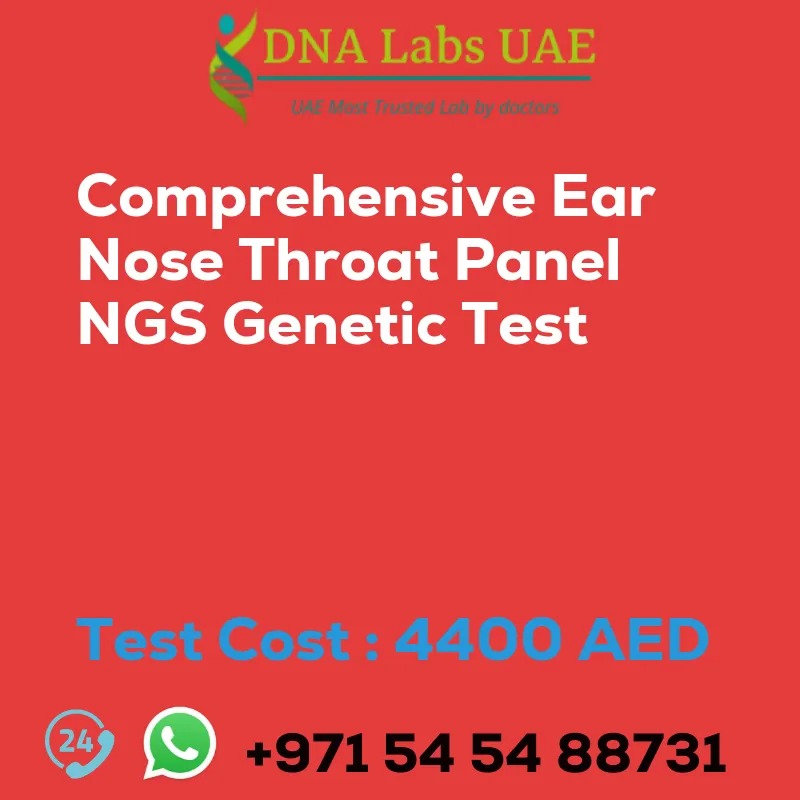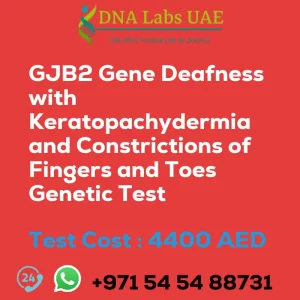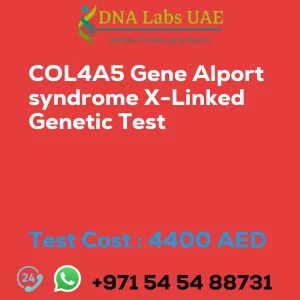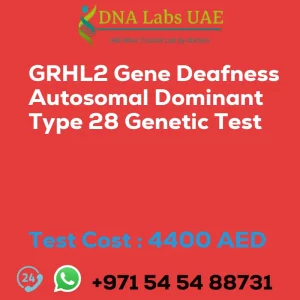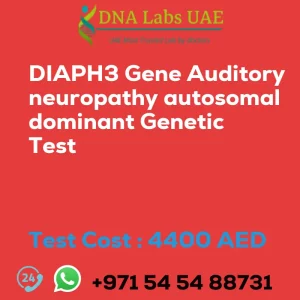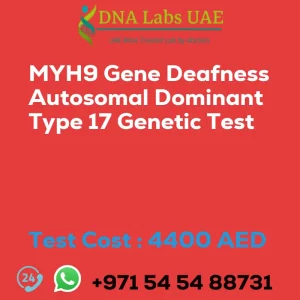Comprehensive Ear Nose Throat Panel NGS Genetic Test
Cost: AED 4400.0
Symptoms, Diagnosis, and Test Details
The Comprehensive Ear Nose Throat (ENT) Panel is a Next-Generation Sequencing (NGS) genetic DNA test that analyzes a patient’s DNA for genetic mutations associated with various ENT disorders. This panel is designed to identify mutations that may cause hearing loss, balance disorders, chronic sinusitis, and other related conditions.
The test analyzes a patient’s DNA for mutations in over 150 genes associated with ENT disorders. These genes are involved in various biological processes such as the development and maintenance of the ear, nose, and throat tissues, as well as the regulation of immune responses.
The test is performed using a small blood sample or saliva sample, which is then analyzed using NGS technology. The results of the test are interpreted by a team of genetic counselors and medical professionals, who provide a comprehensive report detailing any identified mutations and their associated risks.
The Comprehensive ENT Panel can be used to diagnose genetic disorders that may be causing a patient’s ENT symptoms, as well as to identify potential carriers of genetic mutations that may be passed on to future generations. This information can help patients and their healthcare providers make informed decisions about their care and treatment options.
Test Name: Comprehensive Ear Nose Throat Panel NGS Genetic DNA Test
Components: Price 4400.0 AED
Sample Condition: Blood or Extracted DNA or One drop Blood on FTA Card
Report Delivery: 3 to 4 Weeks
Method: NGS Technology
Test type: Ear Nose Throat Disorders
Doctor: ENT Doctor
Test Department: Genetics
Pre Test Information
Clinical History of Patient who is going for Comprehensive Ear Nose Throat Panel NGS Genetic DNA Test. A Genetic Counselling session to draw a pedigree chart of family members affected with ABHD12, ACTB, ACTG1, ADCY1, ADGRV1, AIFM1, ANKH, ATP2B2, ATP6V1B1, ATP6V1B2, BCS1L, BDP1, BSND, BTD, CABP2, CACNA1D, CCDC50, CD151, CD164, CDC14A, CDH23, CDKN1C, CEACAM16, CEP78, CHD7, CHSY1, CIB2, CISD2, CLDN14, CLIC5, CLPP, CLRN1, COCH, COL11A1, COL11A2, COL2A1, COL4A3, COL4A4, COL4A5, COL4A6, COL9A1, COL9A2, COL9A3, CRYM, DCAF17, DCDC2, DIABLO, DIAPH1, DIAPH3, DLX5, DMXL2, DNMT1, DSPP, EDN3, EDNRB, ELMOD3, EPS8, EPS8L2, ESPN, ESRP1, ESRRB, EYA1, EYA4, FDXR, FGF3, FGFR1, FGFR2, FGFR3, FOXI1, GAB1, GATA3, GIPC3, GJA1, GJB2, GJB3, GJB6, GPRASP2, GPSM2, GRHL2, GRXCR1, GRXCR2, GSDME, HARS1, HARS2, HGF, HOMER2, HOXB1, HSD17B4, ILDR1, KARS1, KCNE1, KCNJ10, KCNQ1, KCNQ4, KIT, KITLG, LARS2, LHFPL5, LOXHD1, LRP2, LRTOMT, MAN2B1, MANBA, MARVELD2, MCM2, MET, MGP, MITF, MPZL2, MSRB3, MYH14, MYH9, MYO15A, MYO3A, MYO6, MYO7A, NARS2, NDP, NLRP3, OPA1, OSBPL2, OTOA, OTOF, OTOG, OTOGL, P2RX2, PAX3, PCDH15, PDZD7, PEX1, PEX26, PEX6, PJVK, PMP22, PNPT1, POLR1C, POLR1D, POU3F4, POU4F3, PRPS1, RDX, RMND1, ROR1, RPS6KA3, S1PR2, SALL1, SALL4, SEMA3E, SERPINB6, SIX1, SIX5, SLC12A1, SLC17A8, SLC19A2, SLC26A4, SLC26A5, SLC29A3, SLC33A1, SLC44A4, SLC52A2, SLC52A3, SLITRK6, SMAD4, SMPX, SNAI2, SOX10, SOX2, SPATA5, STRC, SUCLA2, SUCLG1, SYNE4, TBC1D24, TBX1, TCOF1, TECTA, TFAP2A, TIMM8A, TJP2, TMC1, TMIE, TMPRSS3, TNC, TPRN, TRIOBP, TRMU, TSPEAR, TWNK, TYR, USH1C, USH1G, USH2A, VCAN, WBP2, WFS1, WHRN
| Test Name | Comprehensive Ear Nose Throat Panel NGS Genetic DNA Test |
|---|---|
| Components | |
| Price | 4400.0 AED |
| Sample Condition | Blood or Extracted DNA or One drop Blood on FTA Card |
| Report Delivery | 3 to 4 Weeks |
| Method | NGS Technology |
| Test type | Ear Nose Throat Disorders |
| Doctor | ENT Doctor |
| Test Department: | Genetics |
| Pre Test Information | Clinical History of Patient who is going for Comprehensive Ear Nose Throat Panel NGS Genetic DNA Test. A Genetic Counselling session to draw a pedigree chart of family members affected with ABHD12, ACTB, ACTG1, ADCY1, ADGRV1, AIFM1, ANKH, ATP2B2, ATP6V1B1, ATP6V1B2, BCS1L, BDP1, BSND, BTD, CABP2, CACNA1D, CCDC50, CD151, CD164, CDC14A, CDH23, CDKN1C, CEACAM16, CEP78, CHD7, CHSY1, CIB2, CISD2, CLDN14, CLIC5, CLPP, CLRN1, COCH, COL11A1, COL11A2, COL2A1, COL4A3, COL4A4, COL4A5, COL4A6, COL9A1, COL9A2, COL9A3, CRYM, DCAF17, DCDC2, DIABLO, DIAPH1, DIAPH3, DLX5, DMXL2, DNMT1, DSPP, EDN3, EDNRB, ELMOD3, EPS8, EPS8L2, ESPN, ESRP1, ESRRB, EYA1, EYA4, FDXR, FGF3, FGFR1, FGFR2, FGFR3, FOXI1, GAB1, GATA3, GIPC3, GJA1, GJB2, GJB3, GJB6, GPRASP2, GPSM2, GRHL2, GRXCR1, GRXCR2, GSDME, HARS1, HARS2, HGF, HOMER2, HOXB1, HSD17B4, ILDR1, KARS1, KCNE1, KCNJ10, KCNQ1, KCNQ4, KIT, KITLG, LARS2, LHFPL5, LOXHD1, LRP2, LRTOMT, MAN2B1, MANBA, MARVELD2, MCM2, MET, MGP, MITF, MPZL2, MSRB3, MYH14, MYH9, MYO15A, MYO3A, MYO6, MYO7A, NARS2, NDP, NLRP3, OPA1, OSBPL2, OTOA, OTOF, OTOG, OTOGL, P2RX2, PAX3, PCDH15, PDZD7, PEX1, PEX26, PEX6, PJVK, PMP22, PNPT1, POLR1C, POLR1D, POU3F4, POU4F3, PRPS1, RDX, RMND1, ROR1, RPS6KA3, S1PR2, SALL1, SALL4, SEMA3E, SERPINB6, SIX1, SIX5, SLC12A1, SLC17A8, SLC19A2, SLC26A4, SLC26A5, SLC29A3, SLC33A1, SLC44A4, SLC52A2, SLC52A3, SLITRK6, SMAD4, SMPX, SNAI2, SOX10, SOX2, SPATA5, STRC, SUCLA2, SUCLG1, SYNE4, TBC1D24, TBX1, TCOF1, TECTA, TFAP2A, TIMM8A, TJP2, TMC1, TMIE, TMPRSS3, TNC, TPRN, TRIOBP, TRMU, TSPEAR, TWNK, TYR, USH1C, USH1G, USH2A, VCAN, WBP2, WFS1, WHRN |
| Test Details |
The Comprehensive Ear Nose Throat (ENT) Panel is a Next-Generation Sequencing (NGS) genetic DNA test that analyzes a patient’s DNA for genetic mutations associated with various ENT disorders. This panel is designed to identify mutations that may cause hearing loss, balance disorders, chronic sinusitis, and other related conditions. The test analyzes a patient’s DNA for mutations in over 150 genes associated with ENT disorders. These genes are involved in various biological processes such as the development and maintenance of the ear, nose, and throat tissues, as well as the regulation of immune responses. The test is performed using a small blood sample or saliva sample, which is then analyzed using NGS technology. The results of the test are interpreted by a team of genetic counselors and medical professionals, who provide a comprehensive report detailing any identified mutations and their associated risks. The Comprehensive ENT Panel can be used to diagnose genetic disorders that may be causing a patient’s ENT symptoms, as well as to identify potential carriers of genetic mutations that may be passed on to future generations. This information can help patients and their healthcare providers make informed decisions about their care and treatment options. |

